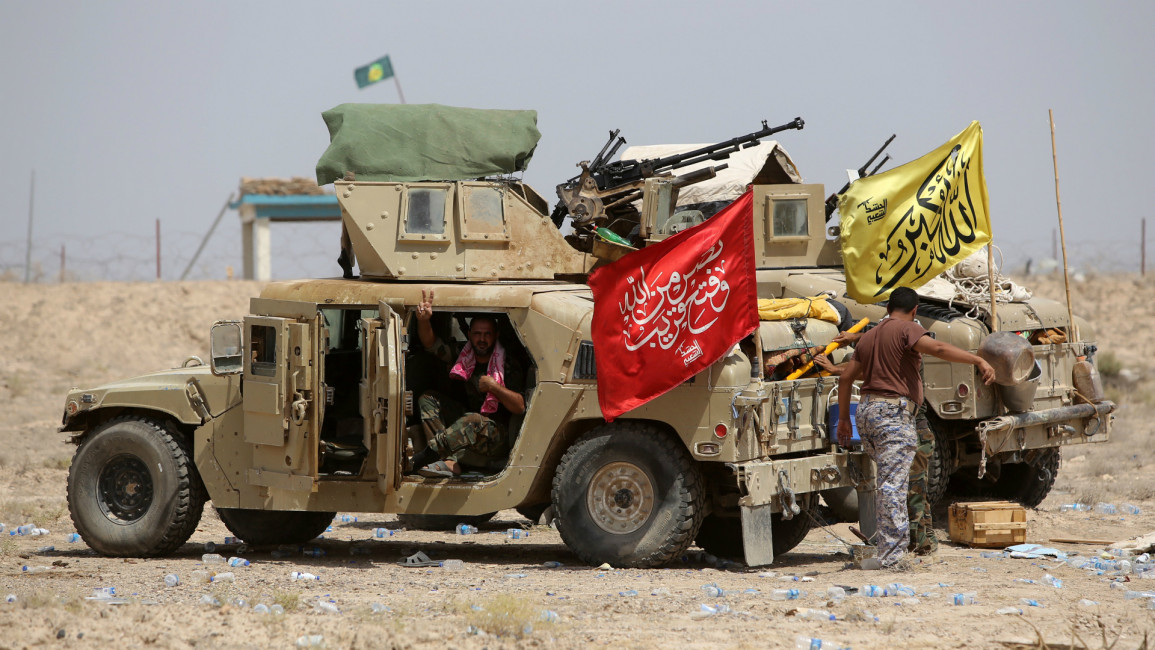UK warns against Shia militia role in Mosul battle
UK warns against Shia militia role in Mosul battle
Rights groups claim the Hashd al-Shaabi are guilty of human rights abuses and should be kept away from any decisive battle with the Islamic State for control of Mosul.
3 min read
Rights groups say the Hashd al-Shabi is guilty of human rights abuses [AFP]
The UK has called on the international coalition currently preparing for a decisive attack on the Iraqi, Islamic State-controlled city of Mosul to ensure it does not support “certain Shia militia units” with questionable human rights records.
“The coalition goal is to liberate Mosul by expelling Daesh (Islamic State) in a way that minimises the humanitarian impact, civilian casualties and human rights abuses and violations,” Tobias Ellwood, Minister for the Middle East and Africa at Britain’s Foreign and Commonwealth Office, said speaking earlier this week.
“We have spoken to Coalition partners, including the US and the Government of Iraq and the Kurdistan Regional Government, and have made clear that forces taking Mosul need to respect human rights and laws of armed conflict.”
Ellwood’s comments came after Julian Lewis, chairman of the House of Commons Defence Committee queried whether the Iraqi Shia militia Hashd al-Shaabi would be taking part in the offensive.
Fear of retributive violence
The Hashd al-Shaabi, or Popular Mobilisation Forces, are an Iraqi-state linked organisation of mainly Shia Muslim militias formed in June 2014 in order to respond to the threat posed by the expansion of the Islamic State group [IS]. Some militias within the group receive direct support from Iran.
Since its formation the group has been accused of human rights abuses against Sunni populations it has liberated from IS control in Iraq. Human rights groups have expressed concern that the participation of Hashd al-Shaabi in an assault on Mosul could lead to retributory attacks on Mosul’s civilian population and human rights abuses.
On Wednesday, seeking to assuage growing concerns, a Peshmerga spokesman denied reports claiming that Hashd troops had arrived near Mosul in preparation for a decisive assault.
"The two military units from the Iraqi military who have come to the Shekhan areas do not have anything to do with Hashd al-Shaabi,” said Halgurd Hikmat, in comments published in Rudaw.
Developments outside Mosul
Earlier, the Iraqi Kurdistan based news agency cited military sources claiming that heavily armed Hashd troops had arrived in the Kurdish town of Shekhan, outside Mosul, late on Tuesday night.
Forces from 16 different countries including the US, UK, France, Germany, and Iran, are currently said to be in Iraq in preparation for an attack on Mosul, with Iraqi authorities notably rejecting the participation of Turkish troops in any assault on the city.
Humanitarian groups including UNHCR have warned that the battle for Mosul could result in a “humanitarian catastrophe” with estimates approximating the attack could create an additional 700,000 refugees.
“The coalition goal is to liberate Mosul by expelling Daesh (Islamic State) in a way that minimises the humanitarian impact, civilian casualties and human rights abuses and violations,” Tobias Ellwood, Minister for the Middle East and Africa at Britain’s Foreign and Commonwealth Office, said speaking earlier this week.
“We have spoken to Coalition partners, including the US and the Government of Iraq and the Kurdistan Regional Government, and have made clear that forces taking Mosul need to respect human rights and laws of armed conflict.”
Ellwood’s comments came after Julian Lewis, chairman of the House of Commons Defence Committee queried whether the Iraqi Shia militia Hashd al-Shaabi would be taking part in the offensive.
Fear of retributive violence
The Hashd al-Shaabi, or Popular Mobilisation Forces, are an Iraqi-state linked organisation of mainly Shia Muslim militias formed in June 2014 in order to respond to the threat posed by the expansion of the Islamic State group [IS]. Some militias within the group receive direct support from Iran.
Since its formation the group has been accused of human rights abuses against Sunni populations it has liberated from IS control in Iraq. Human rights groups have expressed concern that the participation of Hashd al-Shaabi in an assault on Mosul could lead to retributory attacks on Mosul’s civilian population and human rights abuses.
On Wednesday, seeking to assuage growing concerns, a Peshmerga spokesman denied reports claiming that Hashd troops had arrived near Mosul in preparation for a decisive assault.
"The two military units from the Iraqi military who have come to the Shekhan areas do not have anything to do with Hashd al-Shaabi,” said Halgurd Hikmat, in comments published in Rudaw.
Developments outside Mosul
Earlier, the Iraqi Kurdistan based news agency cited military sources claiming that heavily armed Hashd troops had arrived in the Kurdish town of Shekhan, outside Mosul, late on Tuesday night.
Forces from 16 different countries including the US, UK, France, Germany, and Iran, are currently said to be in Iraq in preparation for an attack on Mosul, with Iraqi authorities notably rejecting the participation of Turkish troops in any assault on the city.
Humanitarian groups including UNHCR have warned that the battle for Mosul could result in a “humanitarian catastrophe” with estimates approximating the attack could create an additional 700,000 refugees.
A US-plan for Mosul is said to have been delivered to Iraqi Prime Minister Haider al-Abadi in September and also contained provisions hazarding against the participation of the Hashd al-Shaabi.
Speaking to The New Arab in September an Iraqi official stated that the assault on Mosul would be lead by the Iraqi military and police in conjunction with Peshmerga and tribal Sunni forces.
“As for the Hashd al-Shaabi,” said the official, “they will not enter because of fears of reprisal attacks against the Sunni residents such as what happened in Fallujah, Tikrit and the Khalidiya Island," he said.


![President Pezeshkian has denounced Israel's attacks on Lebanon [Getty]](/sites/default/files/styles/image_684x385/public/2173482924.jpeg?h=a5f2f23a&itok=q3evVtko)



 Follow the Middle East's top stories in English at The New Arab on Google News
Follow the Middle East's top stories in English at The New Arab on Google News


